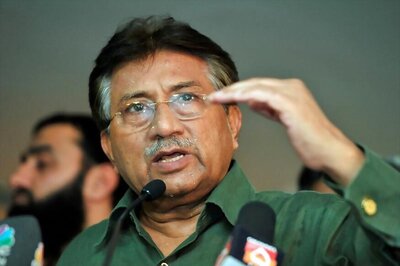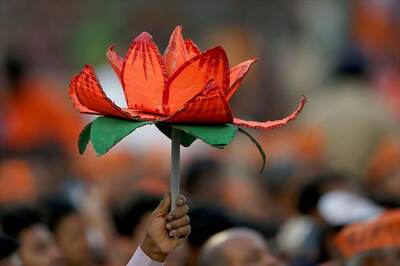
views
Due to the government's dire situation, especially when it comes to the fiscal deficit, Chief Economic Advisor Kaushik Basu tells CNBC-TV18 that the mantra this year is going to be fiscal consolidation. "Fiscal consolidation is definitely on the cards because the lack of it will have an adverse effect on prices and economic growth," he said.
However, he isn't confident of many reforms going through this year.
The author of the Economic Survey on Thursday announced the FY13 growth forecast at 7.6 per cent and FY14 at 8.6 per cent, both of which are higher that estimates. "We are more optimistic for FY14 because we believe the savings and investment rate will pick up going forward," he explained.
Speaking about the RBI's credit policy, Basu says that the central bank's decision to keep rates unchanged was expected. "The RBI cut CRR in response to slowing growth, so it will keep an eye on inflation now before it decides to move on interest rates," he said. However, he says the RBI may start thinking of easing within six weeks.
Below is an edited transcript of his interview with Shereen Bhan. Also watch the accompanying videos.
Q: For FY13 you anticipate 7.6 per cent and for FY14 you are anticipating 8.6 per cent. Now this is higher than what most non-government agencies as well as analyst and economists are anticipating. I know you are basing these numbers on the fact that you hope to see an increase in both the savings rate and the investment rate, but what are you basing that confidence on?
A: Our forecast for 2012-2013 is 7.6 per cent. Here we are actually not relying on an increase in the savings and investment rate. In fact my expectation is that there maybe a slight further slowing down of savings and investment rate. We are growing below capacity, so if we begin to inch towards capacity, there should be a slow recovery. So 7.6 per cent for the coming year is not a very buoyant forecast that I am making and it's pretty much in keeping with a whole lot of others are saying.
Where we are being more optimistic in the Economic Survey is for the following year, that is 2013-2014, where we are putting the forecast at 8.6 per cent. There we do believe that the savings rate and the investment rate will pick up. Once that happens, and a couple of other tugs and pushes that we are expecting happen, 8.6 per cent is indeed on the cards for the year after next.
Q: What is the downside risk to these growth estimates, especially if I were to talk about oil prices? What is the number that you have factored in terms of oil prices while calculating your estimates?
A: We were using the number that was coming in as we were doing our calculation, and that is close to $120 per barrel. If it goes a little bit higher, which it is already is, we will manage. But these are forecasts, we are talking about the future, so if it goes to $135 and stays there, our growth forecast will go wrong. Then the whole world will begin to slow down and we will also begin to slow down.
But if oil remains somewhere between $120 and $125, it will be very difficult for us. That will be the reason why we will not get back to 9.5 per cent. But 7.6 per cent is on the cards if it doesn't go much higher.
Q: You have shied away from putting down a deficit number. Just for this year, can you share with us what the deficit number is going to be?
A: I can't share with you that number. Since the Economic Survey gets tabled in Parliament before the Budget, these numbers are not talked about. Keeping with that, I can't really give you a number. You just have to wait for less than 24 hours.
Q: But just a broad sense of really where you see the fiscal deficit given the imperative on fiscal consolidation as well as the government's own constraint of trying to cut down on expenditure and subsidies?
A: Yes we have missed the fiscal deficit this year, but we don't want to give up the mantra of fiscal consolidation just because this particular year has been bad. The Economic Survey says that our medium term and fairly short term target ought to remain fiscal consolidation because if you don't do that there will be pressure on prices, there will be adverse pressure on growth. So fiscal consolidation remains on the card no matter what happens this particular year.
Q: What could be the actionable levers in order for the government to get back to the path of fiscal consolidation that are politically feasible as well?
A: I can't tell you about what are the immediate levers that we can act on, but I can tell you that in the long-run that we would have to work towards is India's tax to GDP ratio. That has gone down compared to where it was three years ago and compared to other countries in a similarly position.
We have to act on expenditure also. In the Survey we have talked about spending money on subsidies, which are important and central for the poor and the vulnerable, but we don't want to tolerate wastage associated with this. So you act on these and you are going to be moving onto the path of fiscal consolidation, further details you will have to wait till tomorrow.
Q: I want to pick up on what the survey says in terms of inflation management, monetary and fiscal policies. Do you believe that time is now come for rates to be unwound?
A: These are of course independent bodies, and I am glad that that's the way it happens in India. Yes we get some suggestion which we feel according to us is the way to go, but on monetary policy the Reserve Bank of India acts and on fiscal policy we act and we listen to each other and then take a decision.
Reserve Bank of India's this particular move that you are talking about was more or less expected. You know Reserve Bank acted very aggressively on CRR just a couple of days ago. Given when they acted on that the expectation was that they have gone in for responding to the fact that growth has slowed down and they will watch inflation and growth for some more time before they take a decision. So there were absolutely no surprises in what you saw today.
Q: But given that we have seen the inflation number coming in, the buzz now is that perhaps even in April it is going to be tough for the Reserve bank to move on the repo front. What is your own assessment and your own view?
A: I would take the view that another six weeks from now, if broadly the trends are the way they have been over the last few months, we should begin to think in terms of easing up on interest rates. The inflation figure that you got yesterday shows that inflation overall is more or less holding in the 6.5 per cent to 7 per cent range. Core inflation has come down and that is what the Reserve Bank of India watches very closely, but overall inflation is more or less holding where it is.
I expect that inflation for the month of April, for which you will get data only in May, will be a drop. The figure that you get for April, I don't know whether you will see a rise or a fall, but after that there is going to be a fall in inflation then it should hold roughly steady with the year clearing at 6.5 per cent and RBI will have to take a call on that.
Q: I want to talk to you about what you say could be contributing to this slowdown in the domestic economy, the slackening in the pace of reforms. You have listed a bunch of reforms from the DTC to the lack of reforms in the APMC Act to the GST to FDI. Given what we have seen, let's just talk about the Railway Budget and what we have seen happen on account of the Railway Budget and that passenger fare hike coming in after a decade. Do, you really feel confident and optimistic that these reforms are going to go through in the short to medium-term?
A: I can't say I feel confident. I like to believe that a couple of these will go through, several will not go through. But if a couple of these go through, given the strengths of our economy, we invest a lot, we save a lot. Our exports, tough the last three-four months have not done well, our exports have done very well. The figure that we have for the year, which is upto the month of January, exports have grown by 23 per cent. So, it's outstripping our GDP growth. So, there are lots of strengths. Give us a couple of reforms that's what I would urge as an economist and India will go right back to where India was, to a very rapid pace of growth.
Q: I want to pick up on what you talk about in terms of the possibility of diesel deregulation. From the reading of your survey, it seems to suggest that you have given up on the hopes of a diesel deregulation. You say for diesel even the rudimentary first steps of freeing prices have not yet occurred. Hence, as an interim measure you are proposing for every litre of diesel sold by an oil marketing company, the government should give us fixed subsidy of a certain number of rupees. Have you given up on the idea of diesel deregulation and explain to us the thinking behind the proposal that you have put forward?
A: Let me clarify that little suggestion that you are reading out from the Economic Survey, if that were to be followed, that will be a very major step towards deregulation. So, what it says is that for every litre, the government gives a fixed amount of subsidy. That means a very important of our diesel deregulation, which is that when global prices rise, consumers will have to pay a higher price, when global prices go down they pay a lower price, that will become effective because the government's subsidy per litre will be fixed.
So, the biggest part of a reform, which is that you begin to expose ordinary people to global price changes, will come in with this reform. Thereafter, of course you want more changes. I don't know whether that will happen. For that matter, I don't even know whether this particular change will happen, but it's a suggestion.
Q: The survey also talks about mobilising foreign funds in a whole bunch of ways, further ECB relaxation for instance. What are the immediate actionable steps, given what we are seeing globally as well as in the domestic economy?
A: I will have to give that a miss really because I am speaking on the eve of the Budget. I don't want to get into topics where there are some overlaps.
Q: Is that a hint that we could perhaps see some thing?
A: No. I am being very straight. I am not giving you a hint one way or the other.
Q: I want to pick up on a comment that you made. You said that there need to be measures to ensure that there are no asset bubbles in the real estate market as well as the stock market. Do you have evidence or reason to believe that we are currently sitting on an asset bubble in either the stock market or the real estate markets? What warranted that comment?
A: We don't believe that we are sitting on a bubble. But that comment is very important because we have seen from the global experience, from United States, from China, that these bubbles form. These bubbles have a huge technical problem. Till the bubbles are very large, there is no way of being completely sure that there is a bubble. So, an Economic Survey alerts you to all kinds of problems. That's all that we were doing. We were not speculating about where we are right now.
Q: This is the last Economic Survey that you have presented as your tenure as the Chief Economic Advisor to the Government of India. This as you yourself pointed out it's a compendium of economic information, perhaps the best commentary that you would like to put out about India's economic scenario. But it's also a prescription for policy action. Do you feel disappointed today that a lot of what goes in as far as economic prescription in the survey translates into nothing, translates into only pieces of paper at the end of the day? Is it an exercise in futility?
A: I don't feel disappointed. One thing is of course I am a realist. I know that we are taking decisions in a democratic polity like India's, every idea will not be taken up. At the same time, when I look back at ideas two years ago in the Economic Survey, what I feel very good about that there are things, which at that time seems completely remote and cannot happen, like direct subsidy is being given for fertiliser, for food, today we are at a juncture whereby using of course Aadhar platform we maybe able to carry out. In fact it's very likely that we will be able to carry out some of these changes. So, I feel that yes, there were many ideas we float, where we know that these ideas will fructify, but we also feel very good that some of them are very in public place and in public discourse.




















Comments
0 comment